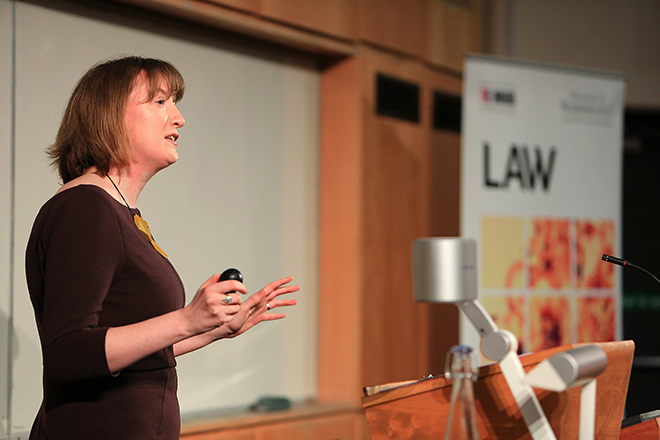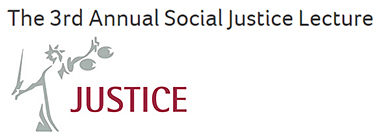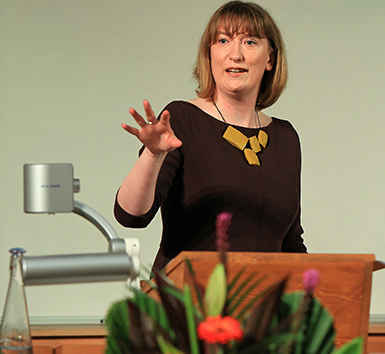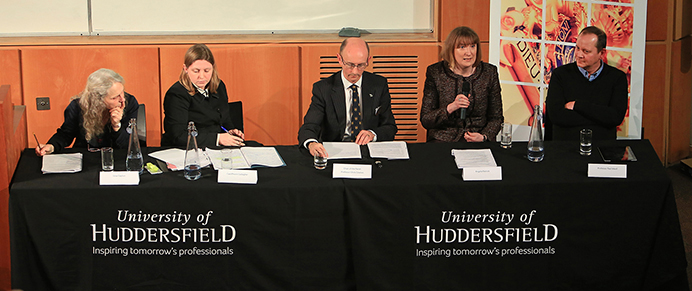“We undermine the Human Rights Act at our peril!”

Tue, 01 Mar 2016 10:38:00 GMT
Barrister Angela Patrick is Director of Human Rights at JUSTICE rails at the Government’s plans to scrap the 1998 Human Rights Act and curtail the role of the European Court of Human Rights
 “WE undermine the Human Rights Act at our peril!” argued lawyer and campaigner Angela Patrick (pictured), when she delivered the 2016 Social Justice Lecture at the University of Huddersfield.
“WE undermine the Human Rights Act at our peril!” argued lawyer and campaigner Angela Patrick (pictured), when she delivered the 2016 Social Justice Lecture at the University of Huddersfield.
A barrister, she is Director of Human Rights for the campaigning organisation JUSTICE and her address – delivered to a large audience in the University’s Diamond Jubilee Lecture Theatre – was a wide-ranging attack on UK Government plans to scrap the 1998 Human Rights Act and curtail the role of the European Court of Human Rights.
 The intention is to replace the Act with a new British Bill of Rights, but Ms Patrick described this as a “bargain bin offer” that would offer worse value in the long run.
The intention is to replace the Act with a new British Bill of Rights, but Ms Patrick described this as a “bargain bin offer” that would offer worse value in the long run.
“Crying freedom might be attractive, but a Bill of Rights that offers fewer rights to fewer people is a really rough deal – not bringing rights home but bringing rights to heel,” she said.
Angela Patrick also suggested that if the UK Government went ahead with its plans, then this could set back the cause of human rights around the world.
“One of our oldest political parties is sending a global message that national governments should have the first and last say on what human rights should be. If this ‘pick n mix’ approach works for us, then will also work for Moscow, Teheran and Beijing,” she said.
“A patchwork of standards would mean no standards at all,” claimed Ms Patrick, adding that the world would be back to where it as in 1945.
Her lecture provided a historical perspective on the origin of the European Declaration on Human Rights – drawn up in part by British lawyers – in the wake of WWII. Its aims included liberty, fair trials, no use of torture, and rights of assembly and freedom from slavery.
Angela Patrick discussed issues such as the limitations of British common law and the problem that would be caused for the UK if the Government proceeded with its plans – for politicians in Scotland and Ulster had different views on human rights legislation.
She spoke of high profile cases that had generated hostile headlines, such as the sustained attempts to deport the fundamentalist Abu Qatada and the controversy over granting voting rights to prisoners. But the success of the Human Rights Act lay in large numbers of small stories that went unreported, she said, and provided a number of case studies.
“There will always be hard cases such as Qatada and prisoners’ votes, but would any human rights legislation that didn’t create tension for government be doing its job?” asked Ms Patrick, who also claimed that the “tainting of judges as anti-democratic has become a popular pastime of politicians.”
However, she added, “an independent judiciary must be a cornerstone of the rule of law”.
 Huddersfield’s Legal Advice Centre
Huddersfield’s Legal Advice Centre
► Panelists (l-r) Gina Clayton, Caoilfhionn Gallagher, Chris Cowton (Chair), Angela Patrick and Professor Paul Ward
After her lecture, Angela Patrick joined a panel of experts who fielded audience questions on human rights legislation and the Government’s plans. The session was chaired by Professor Chris Cowton, who is Dean of the University’s Business School, and the other panellists were University of Huddersfield historian Professor Paul Ward; plus human rights barrister Caoilfhionn Gallagher and Gina Clayton, who is an author and specialist in refugee law.
The annual Social Justice Lecture is organised in association with the Legal Advice Clinic (LAC), an award-winning University of Huddersfield initiative that sees law students providing help and advice from premises in the heart of the town centre.
After a welcome from the LAC’s director, Philip Drake, the lecture was prefaced by a presentation from two of the clinic’s student advisers, Ghosia Tariq and Shaquille Kilbourne. They gave facts and figures that outlined the success of the LAC, which was set up in response to cuts in legal aid that can restrict access to the law.
Ghosia said that in the academic year 2014/15, the value of the LAC’s contribution to the community was placed at £230,155. So far this economic year, it had reached £105, 836, so there is a prospect that the total could soon pass the half a million pound mark.
Both students spoke about the personal value of being advisers in the LAC, working with the public in fields such as family law.
“Gaining legal knowledge from your law degree is one thing, but being able to put it into practice is a whole new ball game,” said Ghosia, and Shaquille spoke of his growing confidence in working with clients.







